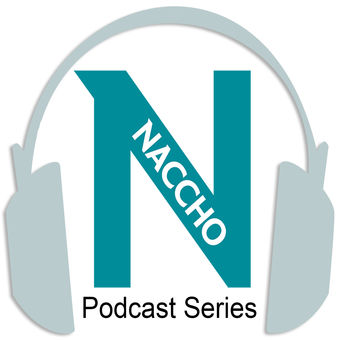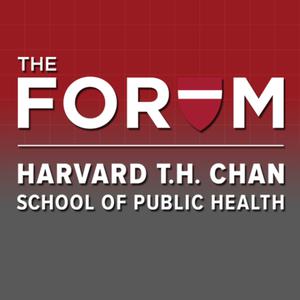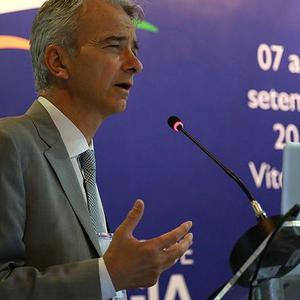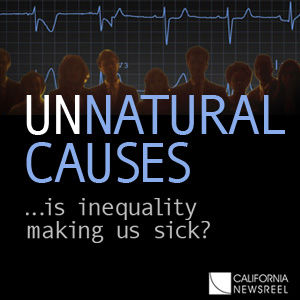
The NACCHO Podcast Series
NACCHO
The National Association of County and City Health Officials (NACCHO) Podcast Series features in-depth interviews with top public health officials.
- 20 minutes 32 secondsNACCHO’s Podcast from Washington: Updates on Presidential Executive Orders for Public Health and Key Resources to Support Safer Food Systems
Washington, DC, January 30, 2024 — On this podcast episode, the National Association of County and City Health Officials’ (NACCHO) Director of Government Affairs, Victoria Van de Vate, and Government Affairs Senior Specialist, Lauren Soule discuss updates on the 119th Congress and committee leadership, FY25 funding, Senate confirmation hearings, and new Presidential executive orders related to public health activities. To get more public health policy updates and to subscribe to NACCHO’s News from Washington weekly newsletter, visit: www.naccho.org/advocacy/news. Contact us at [email protected].
Later in the program (8:35), Nicholas Adams, Senior Program Analyst for Environmental Health at NACCHO, concludes the five-part Food Safety series by reviewing the resources and programs shared by previous guests and highlighting NACCHO projects that support local food safety. Nicholas discusses how initiatives like the U.S. Food and Drug Administration’s (FDA) Voluntary National Retail Food Regulatory Program Standards, the NEHA-FDA Retail Flexible Funding Model, Retail Program Standards Networks, Oral Learner Train the Trainer Program, and the Council to Improve Foodborne Illness Outbreak Response provide local health departments with the tools to create a safer food system and have a voice in national food safety conversations.
###
About NACCHO
The National Association of County and City Health Officials (NACCHO) represents the over 3,300 local governmental health departments across the country. These city, county, metropolitan, district, and tribal departments work every day to protect and promote health and well-being for all people in their communities. For more information, visit www.naccho.org.
30 January 2025, 7:28 pm - 43 minutes 42 secondsNACCHO’s Podcast from Washington: How Richmond County (NC) Health Department Sustains Effective Retail Food Safety Programs
Washington, DC, December 12, 2024 — On this podcast episode, the National Association of County and City Health Officials’ (NACCHO) Director of Government Affairs, Victoria Van de Vate, welcomes Kevin Sumner, Health Officer and Director at Middle-Brook Regional Health Commission in New Jersey to discuss his experience with advocacy on behalf of local public health. He is a former President of NACCHO’s Board of Directors and has worked for over 35 years in varying capacities including as an environmental health specialist, health educator, and health officer. He is also a former President of the New Jersey Health Officers Association and created the Public Health Associations Collaborative Effort. To get more public health policy updates and to subscribe to NACCHO’s weekly newsletter, visit: www.naccho.org/advocacy.
Later in the program (21:35), Nicholas Adams, Senior Program Analyst for Environmental Health at NACCHO, is joined by Traci Stevens, Environmental Health Specialist at Richmond County Health Department in North Carolina. In this fourth installment of NACCHO’s five-part Food Safety podcast series, they discuss how Richmond County Health Department ensures their retail food safety programs are sustainable. The programs were recently awarded the 2024 Samuel J. Crumbine Consumer Protection Award for their excellence in food safety practices at the local level.
12 December 2024, 6:45 pm - 31 minutes 3 secondsNACCHO’s Podcast from Washington: Local Health Departments in North Carolina Work to Improve Retail Food Safety on the Local Level
Washington, DC, November 21, 2024 — On this podcast episode, the National Association of County and City Health Officials’ (NACCHO) Director of Government Affairs, Victoria Van de Vate, and Lauren Soule, Government Affairs Senior Specialist, discuss the results of the 2024 presidential election, share NACCHO’s recommendations for the next administration and 119th Congress, and provide an update on the ongoing federal FY25 budget negotiations. To get more updates and to subscribe to NACCHO’s weekly newsletter, visit: www.naccho.org/advocacy.
Later in the program (7:23), Nicholas Adams, Senior Program Analyst on NACCHO’s Food Safety Team, is joined by Melissa Ham, who served as a senior consultant with Wake County Environmental Services in North Carolina. In this third installment of NACCHO’s five-part Food Safety podcast series, they discuss efforts to address foodborne illnesses through retail food programs and how the work from the Retail Program Standards Network in North Carolina, a network of local health departments in partnership with the U.S Food and Drug Administration (FDA), has impacted retail food safety work on the local level.
Note: Since the time of the interview, Melissa Ham has moved to a new role as Registered Environmental Health Specialist for Hoke County Environmental Health.
21 November 2024, 5:08 pm - 26 minutes 26 secondsNACCHO’s Podcast From Washington: Boulder County Environmental Health Division in Colorado’s Training Program to Improve Food Handling and Safety Practices
Washington, DC, October 17, 2024 — On this podcast episode, the National Association of County and City Health Officials’ (NACCHO) Director of Government Affairs, Victoria Van de Vate, and Lauren Soule, Government Affairs Senior Specialist, provide insights into federal funding now that Congress is out of session until after the election. They also discuss a recent Coalition to Stop Flu congressional briefing featuring NACCHO member Dr. Dianna Abney, Health Officer at the Charles County Health Department in Maryland, a 30th anniversary of the Vaccines for Children Program event featuring NACCHO’s Board President Dr. Michael Kilkenny, and an open letter from NACCHO CEO Lori Tremmel Freeman to local health departments impacted by the recent hurricanes. For more updates and to subscribe to NACCHO’s weekly newsletter, visit: www.naccho.org/advocacy.
Later in the program (5:03), in this second installment of a five-part Food Safety series, Nicholas Adams, Senior Program Analyst on NACCHO’s Food Safety Team, is joined by Lane Drager, Consumer Protection Program Coordinator at Boulder County Public Health in Boulder County, Colorado. Boulder County has served for several years as a mentor for NACCHO’s Food Safety Mentorship Program under the NEHA-FDA Retail Flexible Funding Model, NACCHO’s Food Safety Workgroup, and with the Council to Improve Foodborne Illness Outbreak Response. In their conversation, Drager discusses Boulder County Environmental Health Division’s oral learner train the trainer program that provides essential food safety training to retail food service staff, regardless of their spoken language. Due to the COVID-19 pandemic, retail food establishments experienced a significant labor shortage that led to burnout and high turnover. The labor shortage forced establishments to hire staff inexperienced in food handling and in recent years, it has been critical for local health departments to update their education and training programs to teach proper food handling practices and information on food safety to a wider audience. Drager also shared the improvements in Boulder County’s food safety management systems that can help inform other local health departments in their food safety work.
###
About NACCHO
The National Association of County and City Health Officials (NACCHO) represents the over 3,300 local governmental health departments across the country. These city, county, metropolitan, district, and tribal departments work every day to protect and promote health and well-being for all people in their communities. For more information, visit www.naccho.org.
17 October 2024, 6:09 pm - 27 minutes 3 secondsPodcast From Washington: Pima County Health Department in Arizona Discusses Their Process for Responding to Foodborne Illness Outbreaks
Washington, DC, September 19, 2024 — On this podcast episode, the National Association of County and City Health Officials’ (NACCHO) Director of Government Affairs, Victoria Van de Vate, and Lauren Mastroberardino, Government Affairs Senior Specialist, provide an outlook for federal funding this fall, as the deadline approaches. They also discuss the House Ways and Means Health Subcommittee hearing titled, “Investing in a Healthier America: Chronic Disease Prevention and Treatment. For more updates and to subscribe to the weekly newsletter, visit: www.naccho.org/advocacy.
Later in the program (7:08), Nicholas Adams, Senior Program Analyst on NACCHO’s Food Safety Team, is joined by Amanda Anderson, Consumer Health and Food Safety Manager at the Pima County Health Department in Arizona — and a member of the 2024 Cohort of NACCHO’s Food Safety Mentorship Program under the NEHA-FDA Retail Flexible Funding Model Grant Program. In this pilot episode of a five-part Food Safety series, Anderson shares how Pima County’s processes for monitoring and responding to foodborne illness outbreaks has significantly improved due to their work on Standard 5 of the FDA’s Voluntary National Retail Food Regulatory Program Standards and with the Council to Improve Foodborne Illness Outbreak Response. The discussion is focused around improving and utilizing a data-driven foodborne illness tracking program that has made major impacts in Pima County’s efforts to respond to outbreaks.
###
About NACCHO
The National Association of County and City Health Officials (NACCHO) represents the over 3,300 local governmental health departments across the country. These city, county, metropolitan, district, and tribal departments work every day to protect and promote health and well-being for all people in their communities. For more information, visit www.naccho.org.
19 September 2024, 6:54 pm - 26 minutes 51 secondsNACCHO’s Podcast From Washington: Special Episode Explores Best Practices for Effective Emergency Preparedness Work on the Local Level
Washington, DC, September 12, 2024 — On this special podcast episode, the National Association of County and City Health Officials’ (NACCHO) Director of Government Affairs, Victoria Van de Vate, welcomes special guest Eric McNulty, Associate Director of the National Preparedness Leadership Initiative at Harvard University, for a bonus episode on best practices to implement for effective preparedness work on the local level. September is National Preparedness Month, and every year NACCHO reinforces the importance of preparing for emergencies and disasters in order to keep families and communities safe.
During this episode, McNulty shares key approaches that public health officials can apply to build trust in their communities, which is essential in any crisis. As McNulty describes, public health officials can position themselves as a trusted voice by engaging in day-to-day conversations with their communities, lead through complexities by identifying the disconnect in a crisis, and make it a daily practice to strengthen communications outreach plans that are relatable and easy to grasp. It is also important to prioritize a crisis recovery plan when preparing for the next public health emergency. Early next year, NACCHO will convene at the 2025 Preparedness Summit, which aims to explore this topic further through the theme of “Pathways to Recovery in the Aftermath of Disasters.” For more information on how to obtain a media pass for the 2025 Preparedness Summit please contact [email protected] – limited passes are available.
###
About NACCHO
The National Association of County and City Health Officials (NACCHO) represents the over 3,300 local governmental health departments across the country. These city, county, metropolitan, district, and tribal departments work every day to protect and promote health and well-being for all people in their communities. For more information, visit www.naccho.org.
12 September 2024, 2:24 pm - 15 minutes 8 secondsNACCHO’s Podcast From Washington: Experts Discuss Key Findings From NACCHO’s New 2024 Public Health Informatics Profile
Washington, DC, August 23, 2024 — On this month’s podcast, the National Association of County and City Health Officials’ (NACCHO) Victoria Van de Vate, Director of Government Affairs, and Lauren Mastroberardino, Government Affairs Senior Specialist, provided an outlook for federal funding this fall, amid the summer Congressional recess and the upcoming election season. They also discussed the Fiscal Year 2025 (FY25) Senate Appropriations Labor, Health and Human Services, Education, and Related Agencies Appropriations bill (also known as the Labor-HHS bill), and how that sets up possible funding negotiations later this year. For more updates and to subscribe to the weekly newsletter, visit: www.naccho.org/advocacy.
Later in the program (6:34), NACCHO’s Victoria Van de Vate, Director of Government Affairs, and Meghan Shea, Senior Program Analyst - Informatics, discussed key findings from NACCHO’s 2024 Public Health Informatics Profile. The first-of-its-kind assessment fills a key gap in our nation’s understanding of the information science workforce, data systems, and the overall scope of informatics at the local public health level. The findings illuminate a wide picture of informatics and data modernization efforts across the country. Notably, key findings show that while over half of local health departments are working on data modernization initiatives, most are doing so without a dedicated informatics team or department. There is also a high level of interest in using AI, with over half of local health departments interested in adapting AI or machine learning into their work.
###
About NACCHO
The National Association of County and City Health Officials (NACCHO) represents the over 3,300 local governmental health departments across the country. These city, county, metropolitan, district, and tribal departments work every day to protect and promote health and well-being for all people in their communities. For more information, visit www.naccho.org.
23 August 2024, 5:28 pm - 13 minutes 6 secondsNACCHO’s Podcast From Washington: Experts Discuss Key Findings From NACCHO’s Recent Immunization Study
Washington, DC, July 12, 2024 — On this month’s podcast, the National Association of County and City Health Officials’ (NACCHO) Victoria Van de Vate, Director of Government Affairs, and Lauren Mastroberardino, Government Affairs Senior Specialist, discussed the Fiscal Year 2025 (FY25) House Appropriations Labor, Health and Human Services, Education, and Related Agencies Appropriations bill (also known as the Labor-HHS bill). The bill covers topline dollar amounts for key public health agencies as well as programs important to local health departments. For more updates and to subscribe to the weekly newsletter, visit: www.naccho.org/advocacy.
Later in the program (6:26), NACCHO’s Kellie Hall, Director of Data Communications; Robin Mowson, Director of Immunization; and Amy Maxson, Senior Program Analyst, discussed key findings from the 2023 Immunization Profile Study released last month. The report shows that half of local health departments reported limited staffing as a key challenge in conducting immunization-related services, despite the recent growth in the overall workforce driven by COVID-related funding. Local health departments have improved access to routine immunizations by expanding clinics in community settings and fostering partnerships with healthcare providers or community leaders. Despite the increased activities to expand access, 82% of local health departments still reported that vaccine hesitancy was a barrier to conducting immunization-related activities.
###
About NACCHO
The National Association of County and City Health Officials (NACCHO) represents the over 3,300 local governmental health departments across the country. These city, county, metropolitan, district, and tribal departments work every day to protect and promote health and well-being for all people in their communities. For more information, visit www.naccho.org.
12 July 2024, 12:54 pm - 13 minutes 47 secondsPodcast From Washington: Experts Discuss Changes in Local Health Department Infrastructure From New Forces of Change Survey Report
Washington, DC, June 14, 2024 — On this month’s podcast, the National Association of County and City Health Officials’ (NACCHO) Victoria Van de Vate, Director of Government Affairs, and Lauren Mastroberardino, Government Affairs Senior Specialist, provided an outlook on the Fiscal Year 2025 federal funding landscape and the implications for local public health.
Later in the program (5:02), NACCHO’s Kellie Hall, Director of Data Communications; David Okereke, Senior Research Specialist; Victoria Van de Vate, Director of Government Affairs; and Meghan Shea, Senior Program Analyst for Informatics, discussed important research findings from NACCHO’s 2023 Forces of Change Survey, which assesses changes in local health department infrastructure driven by public health trends. The recently released report describes local health department billing capacity, the use and growth of the community health worker workforce, social determinants of health activities, and data modernization efforts.
To learn more about the findings from the 2023 Forces of Change Survey, visit www.naccho.org/forces.
###
About NACCHO
The National Association of County and City Health Officials (NACCHO) represents the over 3,300 local governmental health departments across the country. These city, county, metropolitan, district, and tribal departments work every day to protect and promote health and well-being for all people in their communities. For more information, visit www.naccho.org.
14 June 2024, 11:42 am - 21 minutes 40 secondsPodcast From Washington: Update on H5N1 and Local Health Department Pilot Program Addresses Substance Use Disorders in Pregnancy
Washington, DC, May 17, 2024 — On this month’s podcast, the National Association of County and City Health Officials’ (NACCHO) Adriane Casalotti, Chief of Government and Public Affairs, and Victoria Van de Vate, Director of Government Affairs discussed the current status of the H5N1 avian “bird” flu outbreak in dairy cattle and the situation on coordinating a federal-level response, from making personal protective equipment (PPE) readily available to testing livestock and farmworkers. The Centers for Disease Control and Prevention (CDC) recommends that local health departments connect individuals to testing if they observe an increase in sick animals and farmworkers, utilize CDC communication resources, and ensure that farms and farmworkers have access to PPE.
Later in the program (13:24), Elana Filipos, Program Analyst on the Maternal, Child, and Adolescent Health team at NACCHO, and Mary “Maret” Wachira, Health Educator Consultant and IBCLC at the Florida Department of Health in Citrus County (DOH-Citrus), discussed how DOH-Citrus initiated a pilot program to provide prenatal care and treatment for pregnant people with substance use disorders (SUDs). Drug overdose deaths in pregnant and postpartum women increased significantly between early 2018 to late 2021, according to a recent study by researchers at the National Institute on Drug Abuse at the National Institutes of Health. However, pregnant people seeking support for an SUD during the perinatal period may face stigmatizing barriers to care that prevent them from accessing medical treatment and behavioral interventions. To address this growing public health concern, DOH-Citrus implemented a holistic prenatal care service model that incorporates Medication for Opioid Use Disorder services and mental health counseling during routine prenatal care appointments to improve outcomes for pregnant people and infants in their community.
Learn more about the Citrus County program via a journal article published in the Maternal and Child Health Journal, titled “Addressing Perinatal Opioid Use at a Local Health Department in Florida.”
###
About NACCHO
The National Association of County and City Health Officials (NACCHO) represents the over 3,300 local governmental health departments across the country. These city, county, metropolitan, district, and tribal departments work every day to protect and promote health and well-being for all people in their communities. For more information, visit www.naccho.org.
17 May 2024, 4:31 pm - 36 minutes 2 secondsPodcast from Washington: New Changes to the WIC Program and Local Health Officer Discusses Overdose Crisis in America
Washington, DC, April 19, 2024 — On this month’s podcast, the National Association of County and City Health Officials’ (NACCHO) Victoria Van de Vate, Director of Government Affairs, and Lauren Mastroberardino, Government Affairs Senior Specialist, spoke about recent changes to the Special Supplemental Nutrition Program for Women, Infants, and Children (WIC) program and final FY2024 funding amounts for Labor, Health and Human Services, Education, and Related Agencies, which include programs and agencies crucial for public health. Sign up here to receive our Congressional Action Alerts.
Later in the program (5:14), Emily Winkelstein, Director of Overdose Prevention at NACCHO, and Dr. Michael Kilkenny, Chief Executive of the Cabell-Huntington Health Department in West Virginia and incoming NACCHO President, discussed efforts to advance evidence-based overdose prevention initiatives on a local level, with a focus on communities particularly hard-hit by overdose. The Centers for Disease Control and Prevention (CDC) recently released its overdose mortality data for 2022 showing that while fatal overdose rates remained somewhat stable between 2021 and 2022, the number of fatal overdoses had claimed the lives of 107,941 peope in 2022. The data also shows that synthetic opioids combined with stimulants, coming from supply contamination, polysubstance use, or both, are drivers in the fourth wave of the overdose crisis. Dr. Kilkenny discussed some of the harm reduction strategies his jurisdiction has implemented, the importance of using a holistic approach to substance use that centers dignity and respect for people who use drugs, and why using data to understand the scope and needs of the communities most impacted will help address the overdose crisis.
###
About NACCHO
The National Association of County and City Health Officials (NACCHO) represents the country’s over 3,300 local governmental health departments. These city, county, metropolitan, district, and tribal departments work every day to protect and promote health and well-being for all people in their communities. For more information about NACCHO, please visit www.naccho.org.
19 April 2024, 6:10 pm - More Episodes? Get the App
- http://naccho.libsyn.com/podcast
- English
Your feedback is valuable to us. Should you encounter any bugs, glitches, lack of functionality or other problems, please email us on [email protected] or join Moon.FM Telegram Group where you can talk directly to the dev team who are happy to answer any queries.
 The Forum at Harvard T.H. Chan School of Public Health
The Forum at Harvard T.H. Chan School of Public Health
 American Journal of Public Health Podcast
American Journal of Public Health Podcast
 UNNATURAL CAUSES: Is Inequality Making Us Sick?
UNNATURAL CAUSES: Is Inequality Making Us Sick?
 Public Health Lecture Series
Public Health Lecture Series
 NACCHO University podcast series
NACCHO University podcast series